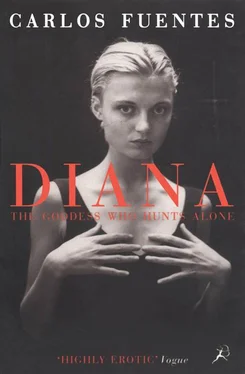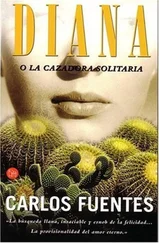Carlos Fuentes - Diana the Goddess Who Hunts Alone
Здесь есть возможность читать онлайн «Carlos Fuentes - Diana the Goddess Who Hunts Alone» весь текст электронной книги совершенно бесплатно (целиком полную версию без сокращений). В некоторых случаях можно слушать аудио, скачать через торрент в формате fb2 и присутствует краткое содержание. Год выпуска: 2012, Издательство: Bloomsbury UK, Жанр: Современная проза, на английском языке. Описание произведения, (предисловие) а так же отзывы посетителей доступны на портале библиотеки ЛибКат.
- Название:Diana the Goddess Who Hunts Alone
- Автор:
- Издательство:Bloomsbury UK
- Жанр:
- Год:2012
- ISBN:нет данных
- Рейтинг книги:3 / 5. Голосов: 1
-
Избранное:Добавить в избранное
- Отзывы:
-
Ваша оценка:
- 60
- 1
- 2
- 3
- 4
- 5
Diana the Goddess Who Hunts Alone: краткое содержание, описание и аннотация
Предлагаем к чтению аннотацию, описание, краткое содержание или предисловие (зависит от того, что написал сам автор книги «Diana the Goddess Who Hunts Alone»). Если вы не нашли необходимую информацию о книге — напишите в комментариях, мы постараемся отыскать её.
Diana the Goddess Who Hunts Alone — читать онлайн бесплатно полную книгу (весь текст) целиком
Ниже представлен текст книги, разбитый по страницам. Система сохранения места последней прочитанной страницы, позволяет с удобством читать онлайн бесплатно книгу «Diana the Goddess Who Hunts Alone», без необходимости каждый раз заново искать на чём Вы остановились. Поставьте закладку, и сможете в любой момент перейти на страницу, на которой закончили чтение.
Интервал:
Закладка:
I thought about Luisa. My jealousy of Diana consumed me even as my love for Diana was dying. I wanted to give that love to Luisa. With her I felt no jealousy at all — she could be the receiver of a love I no longer wanted to waste on my game of mirrors, on the anxiety of all these combinations … I was fooling myself yet again.
It’s true that once more she accepted the rules of our pact. There was no weakness or submission in it, just active strength. Our pact survived all minor accidents. We had a house, a daughter, a group of friends, everything that makes possible the daily life which with Diana was impossible.
I said I was fooling myself. Other irresistible temptations would come. Foreign actresses get bored when they’re on location. They want company without risk. They pass names around among themselves: in India, Tom; in Japan, Dick; in Mexico, Harry. Gentlemen who will take you out, who are well mannered, handsome, intelligent, good to be seen with, good lovers, discreet … How could anyone resist the parade of beauties who formed this information circuit to which, to my eternal joy, I belonged at the age of forty-one? How could I deny myself the game of mirrors in which were reflected image within image within image, passion and jealousy, desire and love, youth and old age, the pact of love and the pact with the devil: Push back my Judgment Day, let me enjoy my youth, my sex, my jealousy, my desires for one more day … but also let me enjoy my pact with Luisa. Why not hope that death, or separation, is a long way off?
She didn’t fool herself. “He’ll always come back to me,” she would tell our friends. She knew that beneath that incessant tide a sediment of necessary stability was amassed, in which love and desire united without violence, discarding the need for jealousy to increase desire, or the need for guilt as thanks for love. Luisa waited patiently behind her incredibly beautiful mestizo mask for the inevitable day when one woman would give me everything I needed. Just one. She wasn’t that woman.
Diana went away. She went when the rainy season began in Mexico and the air once again turned to crystal and gold for a single day.
XXXI
I read about one part of Diana Soren’s final drama in the newspapers.
When Diana left Mexico, she was pregnant. I didn’t know it, but the FBI did. With that information, they decided to destroy her. Why? Because she was an emblematic figure of Hollywood radical chic, the celebrity who lends her fame and gives her money to radical causes. When I met her, Diana supported the Black Panthers. I’ve already mentioned the relationship I found out about at night and by telephone. I knew every shade of her support. The FBI doesn’t deal in subtleties.
I want to imagine that the the “general public” in the United States did differentiate between, say, the integrationist policy of a Martin Luther King and the separatist policy of Malcolm X. I think that during the years I’m talking about many white Americans (many friends of mine) supported King’s nonviolent civil protest as a progressive ideal: the gradual integration of black people into the society of white America, the conquest by blacks of the privileges of whites. Malcolm X, however, advocated a separate, black nation opposed to the white world because it only knew and accepted injustice. If the white world was unjust with itself, how could it not be unjust with the black world? Both, in any case, would live in ghettos separated by color but united in pain, violence, drugs, and misery.
Those irreconcilable options needed a bridge. In Paris, Diana met James Baldwin, who shared at least two things with her: exile as solitude and the search for another, fraternal American. Baldwin, who stood between the two extremes, was a source of perpetual doubt; he deliberately muddied the waters so that no one would believe in easy justice or the inevitability of racial injustice, two faces of the same coin. Baldwin did not want humiliating, charitable integration. Nor did he want the union of black with black to be the chain of hatred toward whites. What Baldwin asked of whites and blacks, Southerners and Northerners, was the simplest and most difficult thing: Treat us like human beings. That’s all.
“Look at me,” Baldwin told Diana. “Look at me and ask yourself about the life, hopes, and universal humanity hidden behind my dark skin …”
Judging by Diana’s nocturnal conversations, I imagined she thought the same. She wanted to be uncompromising about racism and white hypocrisy, but she wanted to be equally uncompromising in her opposition to a black world radically separate from the white world. The explanation seems to me, having known her, quite clear. Diana Soren wanted to see herself as someone else in order to see herself as she was. She took the risk of seeing blacks only as she wanted to see them, and she paid dearly for it.
The FBI, like the KGB, the CIA, the Gestapo, or Pinochet’s DINA, needs to simplify the world so as to designate the enemy clearly and annihilate him without a second thought. Political police agencies, the guardians of the modern world and its well-being, always need a reliable enemy to justify their jobs, their budgets, their children’s daily bread.
In Washington, it was decided that Diana Soren was the ideal candidate for that role. Famous, beautiful, white, the Saint Joan of radical causes (I called her the midwife of revolutionaries without imagining that my metaphor would be a reality in the cruelest way, Diana was placed under surveillance and invisibly, silently harassed by the FBI. The Bureau was waiting for the right moment to destroy her. It was merely a matter of opportunity. Diana Soren was destructible. More than anyone. She believed that injustice was fought not only with politics but with sex, with love, and from the romantic depths which made her ideally vulnerable. When the Bureau learned of Diana’s pregnancy — while she was still in Mexico or soon thereafter — they realized it was time to move against her, to take advantage of her weakness.
It was then I understood General Agustín Cedillo’s warnings and cursed myself for not having found Mario Moya in Mexico, for not believing Diana, for treating her with contempt (“You’re paranoid”) and locking myself in the prison of my jealousy. But really, what could I have done? It was already much too late when I found out what was going on. Was I the father? I don’t think so — we’d taken precautions. Was the father young Carlos Ortiz, my successor in Diana’s favors? That was more likely. She saw him as a revolutionary hero, while I was a tedious repetition of her own husband.
Still, a Mexican revolutionary does not have enough symbolic force to provoke the puritanical democratic white general public of the U.S.A. It would have been like having a baby with Marlon Brando — Viva Zapata! — an exotic experience, yet one that could readily be assimilated. But that the fair, blond star with blue (or were they gray?) eyes, descendant of Swedish immigrants, born in a small Midwestern town, brought up with soda fountains and Mickey Rooney movies, a Lutheran, a graduate of the local high school, the sweetheart of the football team and, one time, of a strong, healthy boy, a girl favored of the gods, chosen from among eighteen thousand hopefuls to play a saint; a rich, free woman married to a famous man, darling of the jet set — that this favorite of the white God would descend to the depths of miscegenation, to the murky, dark surrender of her Caucasian femininity to a brutal black penis, disturbed the night of the American soul, revived the bloody phantoms of castration, of blacks hung with their testicles in their mouths, of burning crosses, of the Klan galloping on …
A mulatto was only acceptable, imaginable, as the son of a white man and a black woman, the result of the whim or despair of the plantation owner, the white master too respectful of his white wife, the white master with the feudal right to spend the first night of marriage with the black bride, the white master enervated by his white wife’s long pregnancy, the father of the mulattoes: a white patriarch …
Читать дальшеИнтервал:
Закладка:
Похожие книги на «Diana the Goddess Who Hunts Alone»
Представляем Вашему вниманию похожие книги на «Diana the Goddess Who Hunts Alone» списком для выбора. Мы отобрали схожую по названию и смыслу литературу в надежде предоставить читателям больше вариантов отыскать новые, интересные, ещё непрочитанные произведения.
Обсуждение, отзывы о книге «Diana the Goddess Who Hunts Alone» и просто собственные мнения читателей. Оставьте ваши комментарии, напишите, что Вы думаете о произведении, его смысле или главных героях. Укажите что конкретно понравилось, а что нет, и почему Вы так считаете.












